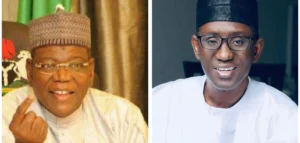
The recent outburst by Alhaji Sule Lamido, a former governor of Jigawa State, former Minister of External Affairs, and elder statesman, against the National Security Adviser (NSA), Malam Nuhu Ribadu, has sparked a debate over the roles of public officials in the polity and the boundaries of free speech. In his remarks, Lamido described Ribadu’s recent actions as “sycophantic, flippant, and unbecoming of an NSA,” accusing him of abandoning professionalism for “toadyism.” However, a deeper dive into this criticism reveals inconsistencies and a lack of objectivity on Lamido’s part, raising questions about his motives and judgment.
As Nigeria’s National Security Adviser, Malam Nuhu Ribadu has a dual responsibility: safeguarding national security and providing strategic counsel to the government. While the position demands discretion, it does not inherently silence its holder. Ribadu, like any other Nigerian, retains the right to voice opinions on national issues, provided they align with the ethos of his office. Suggesting that he should remain mute is tantamount to stifling his freedom of expression—a fundamental right guaranteed by the Constitution.
Ribadu’s vocal approach is not without precedent. Throughout Nigeria’s history, key officials, including NSAs, have spoken publicly to reassure citizens, clarify policies, or address pressing national concerns. To accuse him of sycophancy for fulfilling these roles is, at best, misplaced and, at worst, a deliberate attempt to undermine his credibility.
A Glass House of Criticism
Lamido’s comments also raise questions about his consistency. During his tenure as Minister of External Affairs and later as a governor, Lamido rarely voiced disapproval of then-President Olusegun Obasanjo’s assertive—often overbearing—approach to governance. His silence at the time suggested tacit approval of Obasanjo’s tactics, which included strong-arm politics and a penchant for bulldozing opposition. Criticizing Ribadu now for perceived “toadyism” reeks of hypocrisy and selective memory. It’s a case of the pot calling the kettle black.
While Lamido chose to focus on Ribadu’s alleged shortcomings, he conveniently ignored the NSA’s tangible achievements since assuming office. Under Ribadu’s watch, Nigeria has witnessed significant strides in national security, diplomacy, and strategic planning.
One of Ribadu’s most notable achievements has been in combating banditry in the Northwest and terrorism in the Northeast. Through enhanced intelligence coordination and the deployment of modern surveillance technologies, Ribadu has strengthened the operational efficiency of security agencies in these regions. His efforts have led to the dismantling of several bandit camps, the rescue of kidnapped victims, and the apprehension of high-profile criminal elements. In the Northeast, Ribadu has overseen a revamped counterterrorism strategy that combines military offensives with community-driven deradicalization programs, fostering trust between local populations and the armed forces. These measures have significantly degraded the operational capacity of groups like Boko Haram and ISWAP, restoring relative peace to previously embattled communities and enabling the gradual return of displaced persons to their homes.
In addition, Ribadu’s swift response to the terrorist menace of Lakurawa, in Kebbi State, stands out as a testament to his effectiveness. Within hours of receiving intelligence about the activities of a new terrorist cell, he coordinated a rapid deployment of security personnel to the area. This timely intervention disrupted the group’s operations, neutralized key threats, and reassured local residents of the government’s commitment to their safety. Such decisive actions underscore Ribadu’s proactive approach to addressing emerging threats, earning him commendation from both security experts and affected communities.
An often-overlooked aspect of Ribadu’s strategy is his mastery of psychological operations. In the battle against insurgency, words are as important as weapons. Ribadu’s public statements, often labeled as boastful by detractors, are deliberately crafted to instill fear in the minds of adversaries and demotivate their ranks. History has shown that confidence and strong rhetoric can weaken an enemy’s resolve, creating an aura of invincibility around the state’s forces. By projecting strength and determination, Ribadu has not only reassured Nigerians but also sent a clear message to terrorists and bandits that their days are numbered. This psychological warfare, combined with military action, has proven effective in tilting the balance in favor of security forces.
Let me quickly add, criticism is an essential part of democracy, but it must be constructive, factual, and devoid of personal bias. Lamido’s remarks, however, appear more like an attempt to score political points than a genuine concern for Nigeria’s well-being. By ignoring Ribadu’s achievements and focusing solely on his exercise of free speech, Lamido has done a disservice to public discourse.
It is also worth noting that attacks on Ribadu are not new. His tenure as Chairman of the Economic and Financial Crimes Commission (EFCC) was marked by similar criticisms from entrenched interests threatened by his commitment to reform. Yet, Ribadu’s record of integrity and dedication has consistently silenced detractors over time.
In conclusion, Setting the Record Straight, Malam Nuhu Ribadu is not above reproach, but any critique of his tenure must be balanced, fact-based, and devoid of ulterior motives. As NSA, he has demonstrated a commitment to his role and a willingness to innovate in addressing Nigeria’s security challenges. Alhaji Sule Lamido’s remarks, while provocative, fail to acknowledge these contributions and instead seek to vilify Ribadu for exercising his constitutional rights.
In the end, Nigerians must judge their leaders not by the noise of detractors but by the substance of their actions. Ribadu’s track record speaks volumes, and no amount of rhetoric can overshadow the impact of his work. After all, as the saying goes, “You cannot throw stones when you live in a glass house.” It is high time we focused on building Nigeria together rather than tearing down those striving to make a difference.
* Malam Fatuhu is the Executive Director, Administration and Training, Nigeria Television Authority (NTA)
